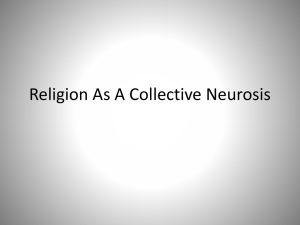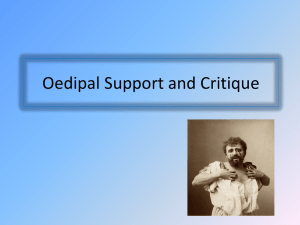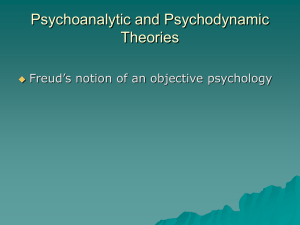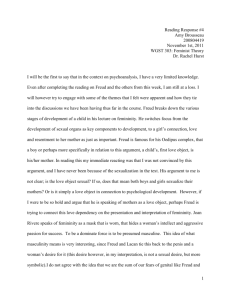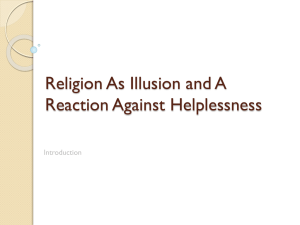Freud essay plan Explain how Freud understood religion (30 marks
advertisement
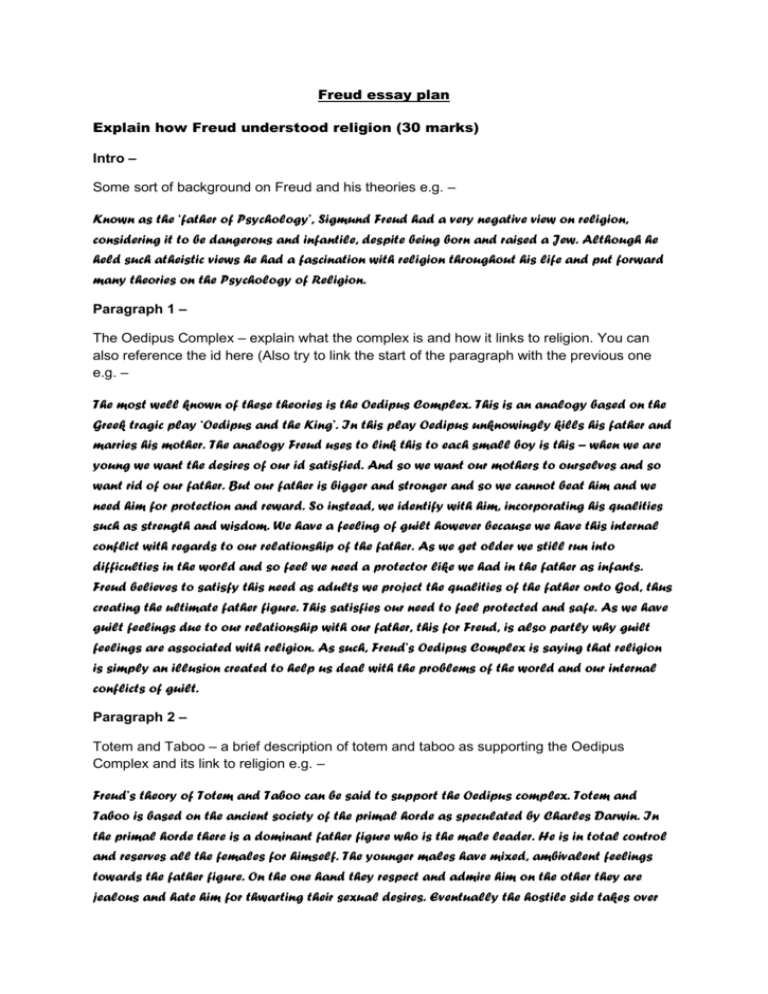
Freud essay plan Explain how Freud understood religion (30 marks) Intro – Some sort of background on Freud and his theories e.g. – Known as the ‘father of Psychology’, Sigmund Freud had a very negative view on religion, considering it to be dangerous and infantile, despite being born and raised a Jew. Although he held such atheistic views he had a fascination with religion throughout his life and put forward many theories on the Psychology of Religion. Paragraph 1 – The Oedipus Complex – explain what the complex is and how it links to religion. You can also reference the id here (Also try to link the start of the paragraph with the previous one e.g. – The most well known of these theories is the Oedipus Complex. This is an analogy based on the Greek tragic play ‘Oedipus and the King’. In this play Oedipus unknowingly kills his father and marries his mother. The analogy Freud uses to link this to each small boy is this – when we are young we want the desires of our id satisfied. And so we want our mothers to ourselves and so want rid of our father. But our father is bigger and stronger and so we cannot beat him and we need him for protection and reward. So instead, we identify with him, incorporating his qualities such as strength and wisdom. We have a feeling of guilt however because we have this internal conflict with regards to our relationship of the father. As we get older we still run into difficulties in the world and so feel we need a protector like we had in the father as infants. Freud believes to satisfy this need as adults we project the qualities of the father onto God, thus creating the ultimate father figure. This satisfies our need to feel protected and safe. As we have guilt feelings due to our relationship with our father, this for Freud, is also partly why guilt feelings are associated with religion. As such, Freud’s Oedipus Complex is saying that religion is simply an illusion created to help us deal with the problems of the world and our internal conflicts of guilt. Paragraph 2 – Totem and Taboo – a brief description of totem and taboo as supporting the Oedipus Complex and its link to religion e.g. – Freud’s theory of Totem and Taboo can be said to support the Oedipus complex. Totem and Taboo is based on the ancient society of the primal horde as speculated by Charles Darwin. In the primal horde there is a dominant father figure who is the male leader. He is in total control and reserves all the females for himself. The younger males have mixed, ambivalent feelings towards the father figure. On the one hand they respect and admire him on the other they are jealous and hate him for thwarting their sexual desires. Eventually the hostile side takes over and the sons group together, kill the father and eat him to incorporate his qualities of strength etc. After this event the sons start to feel guilty as the love they felt for the father that the suppressed at the time of the murder starts to remerge. This guilt results in the arising of totemism (an ancient religion). The sons installed a totem animal which was thought of both as the clan’s ancestor and as its guardian and protector. This totem animal eventually became a God and both the totem animal and the God symbolise the father. Freud explains that the tribe solved the problem of guilt through the fact that the clansmen are under a sacred obligation (subject to automatic sanctions) not to kill or destroy their totem and to avoid eating its flesh (or deriving benefit from it in other ways along with the taboo against having sexual relations with the women of their own tribe. Thus renouncing one and all the ideal of the father’s absolute dominance. Freud relates this to modern day religion by saying that it lives on in guilt and fear of God and avoidance of sex, in the Christian Eucharist (eating of God), and in atonement, leading to reconciliation with the father. The murdered primal father is said to constitute the original image upon which later religions and generations modelled their concept of God. Totem and Taboo supports the Oedipus Complex by showing that is not simply a personal trauma, but one that has affected all societies at a historical level. It helps to explain why religion is universal as a collective neurosis and why the concept of God is such a powerful one: because it stems also from a historical experience that still affects us. Freud believed in some kind of psychological mechanism whereby guilt for the original crime is passed on genetically. Paragraph 3 – Illusion and wish fulfilment. Explain how Freud sees all religion as illusion and explain wish fulfilment e.g. – As seen in the Oedipus Complex, Freud believes that religion is simply an illusion created by humans to fulfil some need or desire. The problem is that the nature of our society is often at conflict with our most basic desires (the desires of the id). And so religion provides us with a reason to submit to authority. It explains our suffering in terms of the need to obey an omnipotent God. It promises reward for suffering in the afterlife and makes society bearable. Religion therefore provides the necessary motivation for sublimation to occur. As the most natural outlet is forbidden it forces our libidos into other areas. Religion can also be used as illusion to help us overcome our fear or natural forces. Freud says that the natural human response to being confronted by natural forces (including death) is panic and helplessness at our defencelessness and solitude. Religion helps by creating the belief that the natural forces are no longer impersonal and that we are no longer powerless because through religious devotion we believe we can control them. We also have the promise of the after-life to look forward to. This also links to wish fulfilment because we wish to feel safe and secure in the world. Freud says we wish when we stand in need of something and we wish by remembering a formerly satisfying object from the past. So in terms of religion we can say that in the past we felt safe and protected from our father and so as adults we wish for this to continue to feel safe. To fulfil this wish we create a God as the ultimate father figure. Paragraph 4 – Collective neurosis – explain what collective neurosis is and how it links to religion e.g. – Freud also draws a comparison between religious rituals and neurotic compulsions. He points out that both are repeated, to be performed exactly, the person feels calm when they are completed and anxiety if they are not done. The similarities between neurotic compulsions and religious rituals lead Freud to the conclusion that religious ritual behaviour is an example of obsessive compulsive behaviour. However, because they provide a shared or common neurosis they are accepted by society. Freud claims that religion protects us from developing individual neuroses which may not be accepted by society. Religion and neurosis can also be linked through repressed guilt. The obsessional neurotic normally has a sense of guilt that motivates their actions (Freud says is usually to do with some sort of sexual repression). The religious believer also feels guilt if they have done something God would not approve of and it is usually at this time they carry out a religious ritual (e.g. prayer). Paragraph 5 – Conclusion – sum up all your points and answer the question! Maybe include one evaluative point at the end in order to lead you into your next essay e.g. – From this discussion we can see that Freud understood religion as illusion based on the desire to feel safe and protected. He also sees it as an immature thing as religion links back to an infantile state where we were weak and helpless and in need of protection and this is why as adults we create a father figure, which we call God. As such, it is something we need to be free from in order for us to develop into mature beings. However, you can argue that Freud’s psychology of religion only really works for monotheistic religions (religions that believe in one God) and religions who see God as a father figure. His theories do not explain polytheistic religions (belief in more than one God).

